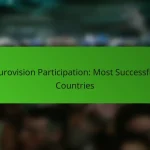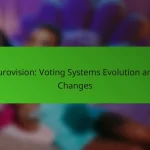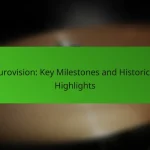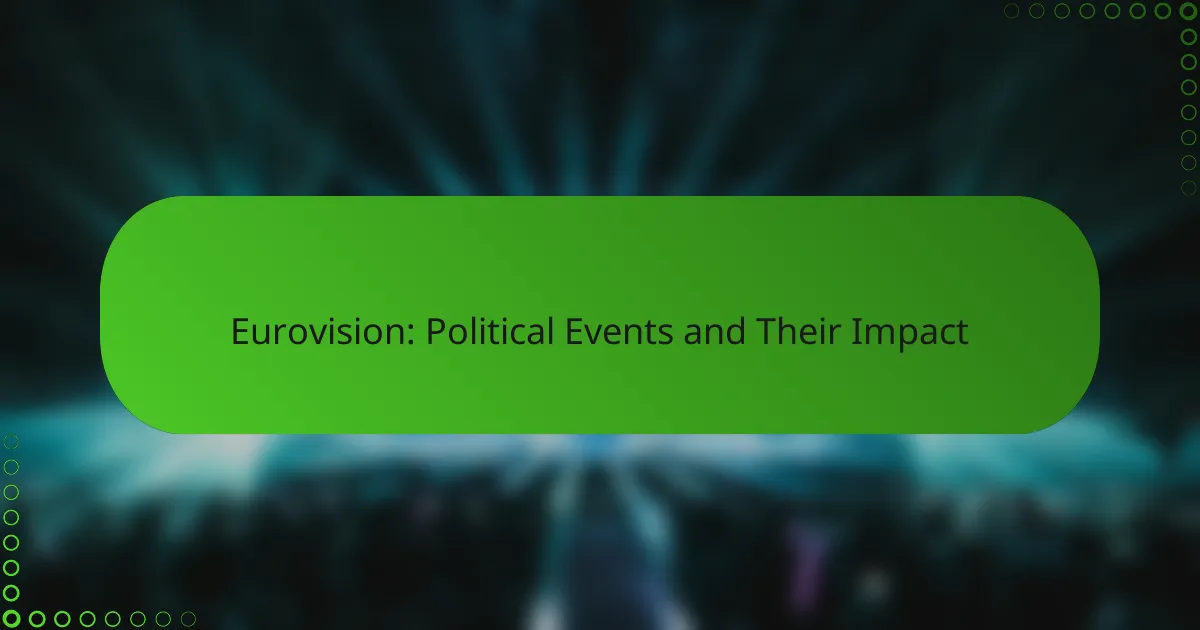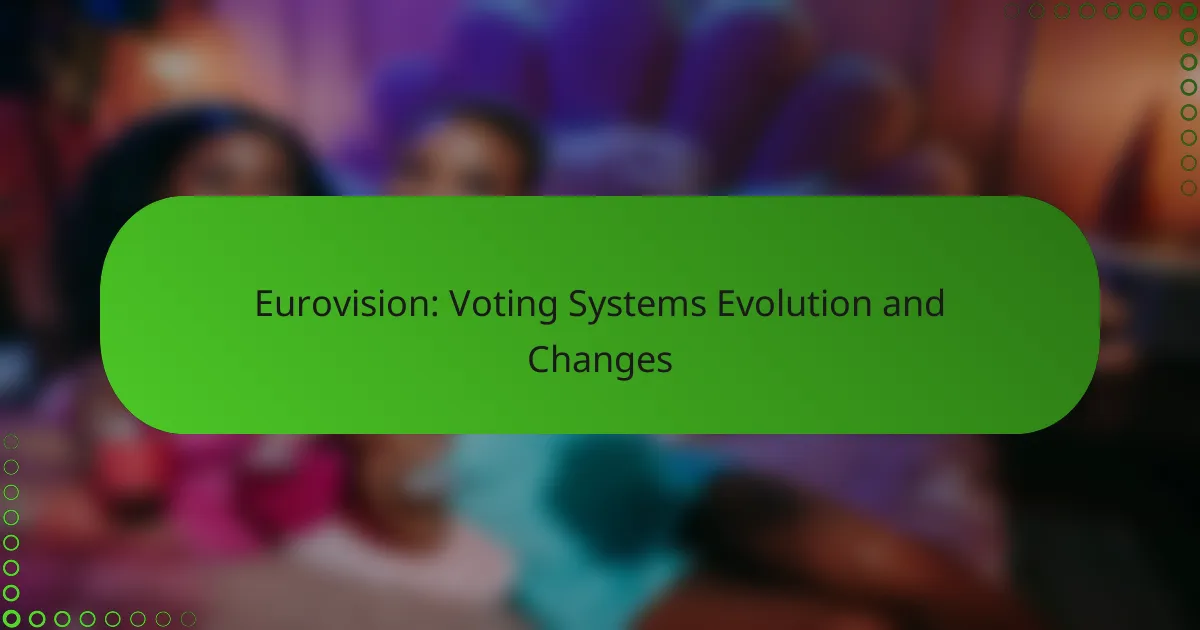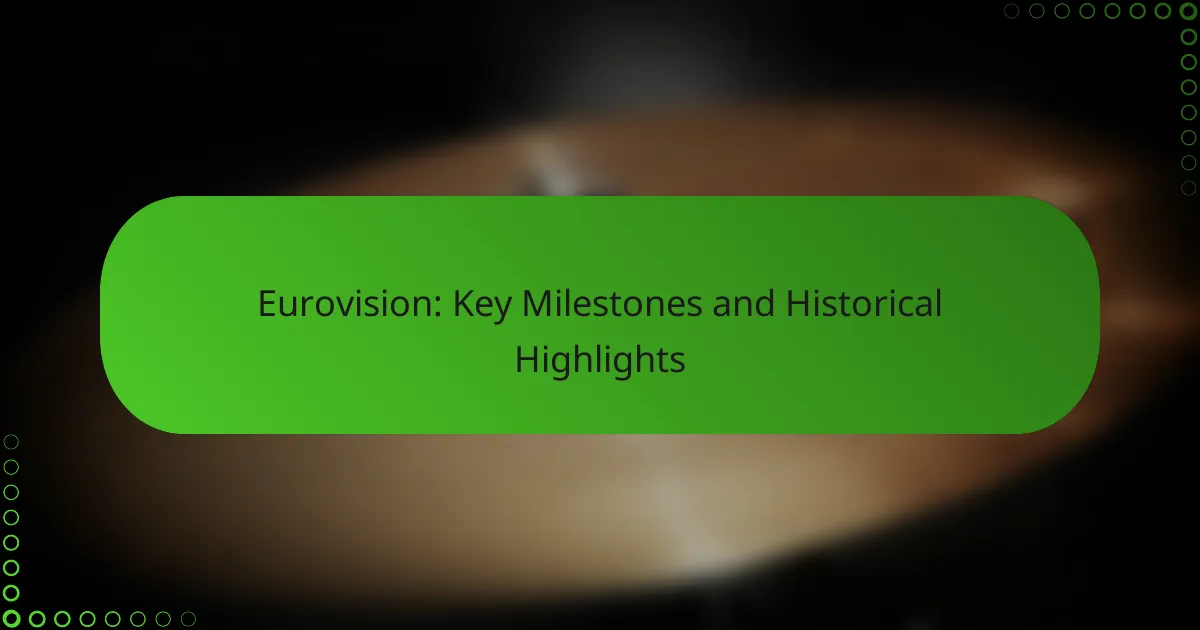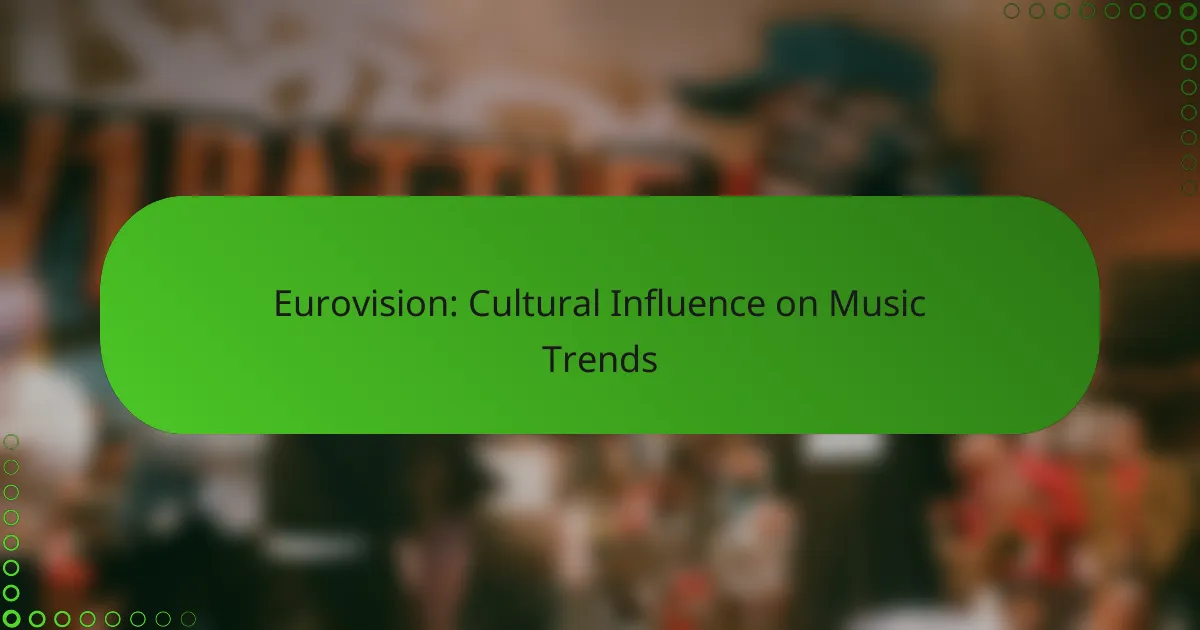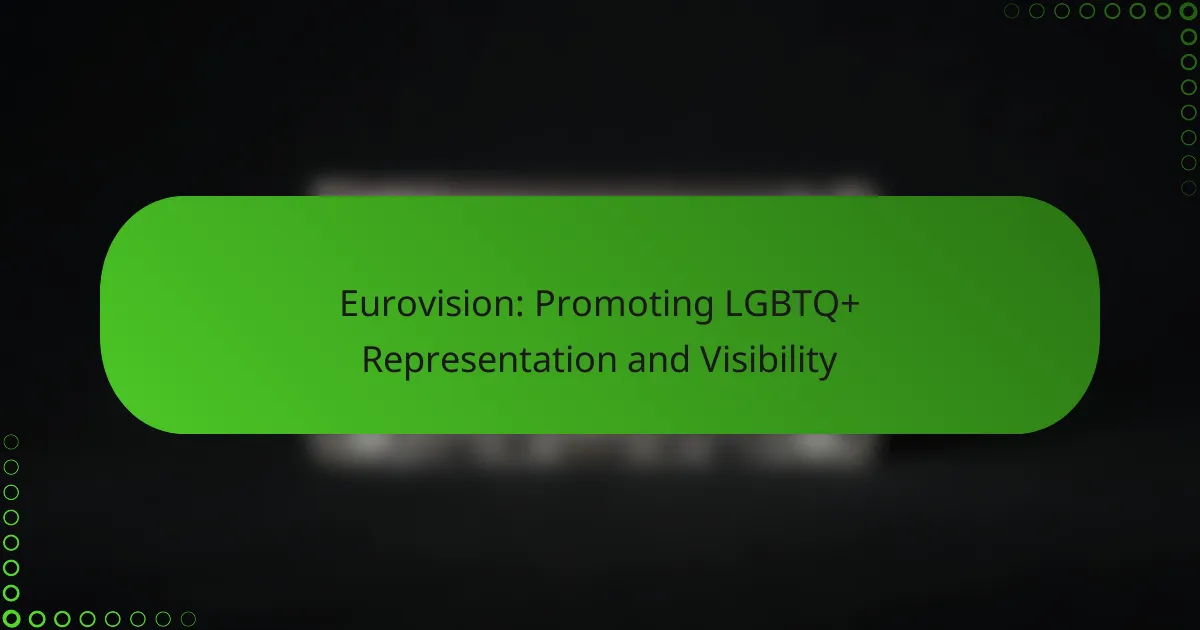The Eurovision Song Contest serves as a vibrant platform where political events can significantly influence outcomes and public perception. Geopolitical tensions, historical alliances, and social issues often shape voting behaviors, leading to outcomes that may prioritize political sentiment over artistic merit. As countries navigate their political landscapes, the contest becomes a reflection of contemporary global dynamics, allowing artists to express national identities and social messages through their performances.
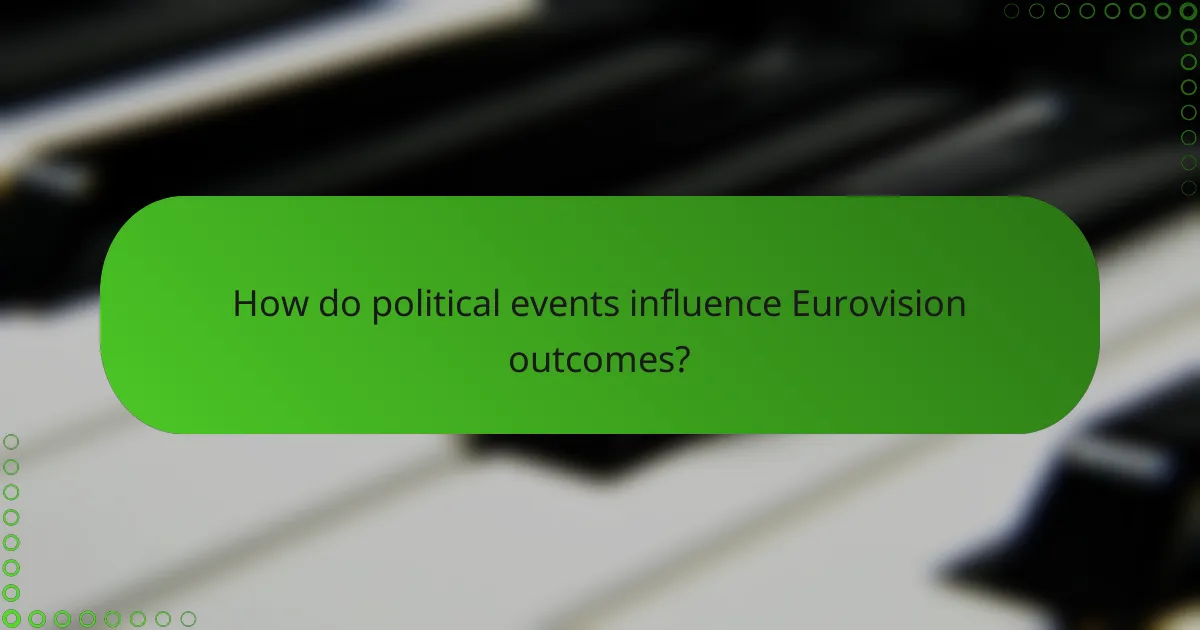
How do political events influence Eurovision outcomes?
Political events significantly impact Eurovision outcomes by shaping public sentiment and influencing voting behaviors among participating countries. Factors such as geopolitical tensions and historical alliances often lead to biased voting patterns that can overshadow the artistic merit of the performances.
Impact of geopolitical tensions
Geopolitical tensions can create a climate where countries vote based on political affiliations rather than the quality of the songs. For example, nations with strained relations may receive fewer points from each other, while those with strong ties often support one another, regardless of the actual performance quality.
In recent years, events such as conflicts or diplomatic disputes have led to noticeable shifts in voting patterns, where countries may rally behind allies or penalize adversaries. This dynamic can skew results, making it essential to consider the broader political landscape when analyzing Eurovision outcomes.
Voting patterns based on alliances
Voting patterns in Eurovision often reflect historical alliances and cultural connections among countries. Neighboring countries or those with shared cultural ties frequently exchange high scores, creating a bloc voting effect. This phenomenon can be observed in regions like the Balkans, where countries often support each other significantly.
Understanding these voting patterns can help predict outcomes, as countries with established alliances tend to perform better. Contestants and delegations should be aware of these dynamics when crafting their entries and marketing strategies.
Historical examples of political voting
Historical examples of political voting in Eurovision highlight how past events can influence current results. For instance, during the Cold War, Eastern Bloc countries often voted for one another, reflecting their political solidarity. This trend has evolved but still persists in various forms today.
Another notable example occurred in 2014 when Russia’s annexation of Crimea affected its voting relationships with Ukraine and other European nations. Such incidents demonstrate how political contexts can directly alter the competitive landscape of Eurovision, emphasizing the importance of understanding these historical influences.
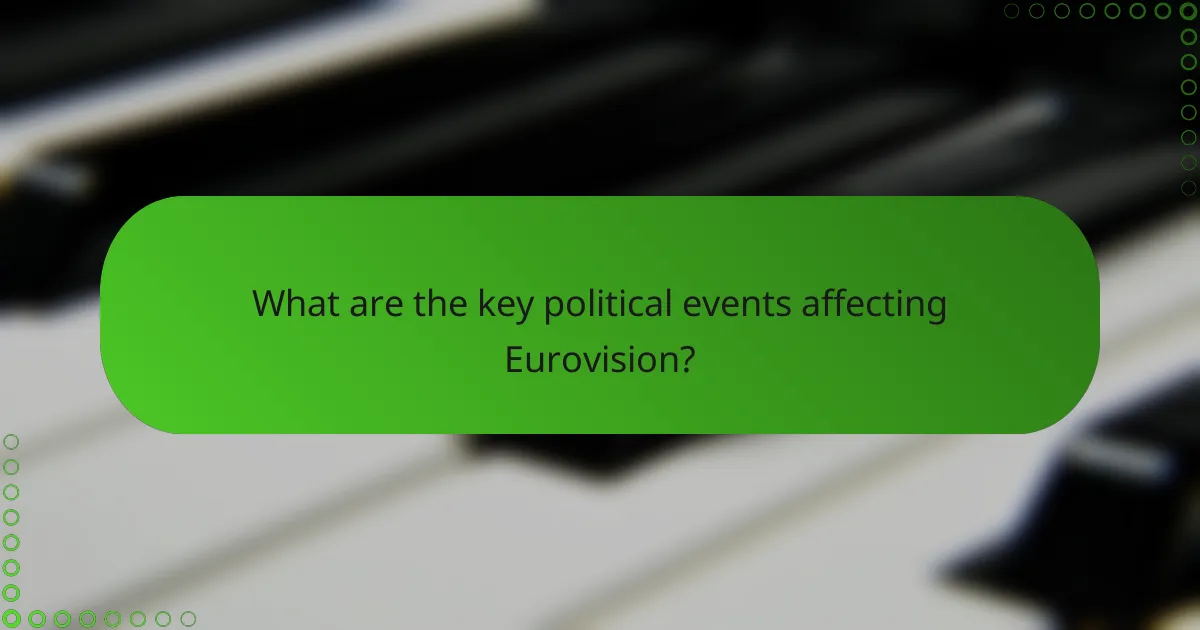
What are the key political events affecting Eurovision?
Key political events significantly influence Eurovision, shaping participant countries’ entries and public reception. Factors such as regional conflicts, changes in government leadership, and international sanctions can alter the dynamics of the competition.
Recent conflicts in Eastern Europe
Recent conflicts in Eastern Europe, particularly the ongoing tensions involving Ukraine and Russia, have had a profound impact on Eurovision. These conflicts can lead to heightened nationalism, affecting how countries present their entries and how audiences respond.
For instance, countries directly involved in conflicts may choose to emphasize themes of resilience or solidarity in their performances. Additionally, public sentiment can sway voting patterns, as viewers may support entries that resonate with their political beliefs or experiences.
Changes in government leadership
Changes in government leadership can shift a country’s approach to Eurovision, influencing both funding and artistic direction. New administrations may prioritize different cultural narratives, which can be reflected in the choice of songs and performers.
For example, a government that emphasizes national pride may select entries that celebrate cultural heritage, while a more progressive leadership might opt for themes of inclusivity and diversity. These shifts can alter how audiences perceive the entries and affect overall reception.
International sanctions and their effects
International sanctions can restrict a country’s participation in Eurovision, impacting both financial support and the ability to promote entries abroad. Countries facing sanctions may struggle to fund their Eurovision campaigns, leading to less competitive performances.
Moreover, sanctions can create a stigma around participating nations, affecting how other countries vote. For example, entries from sanctioned countries may receive less support due to political biases, which can skew results and influence future participation strategies.
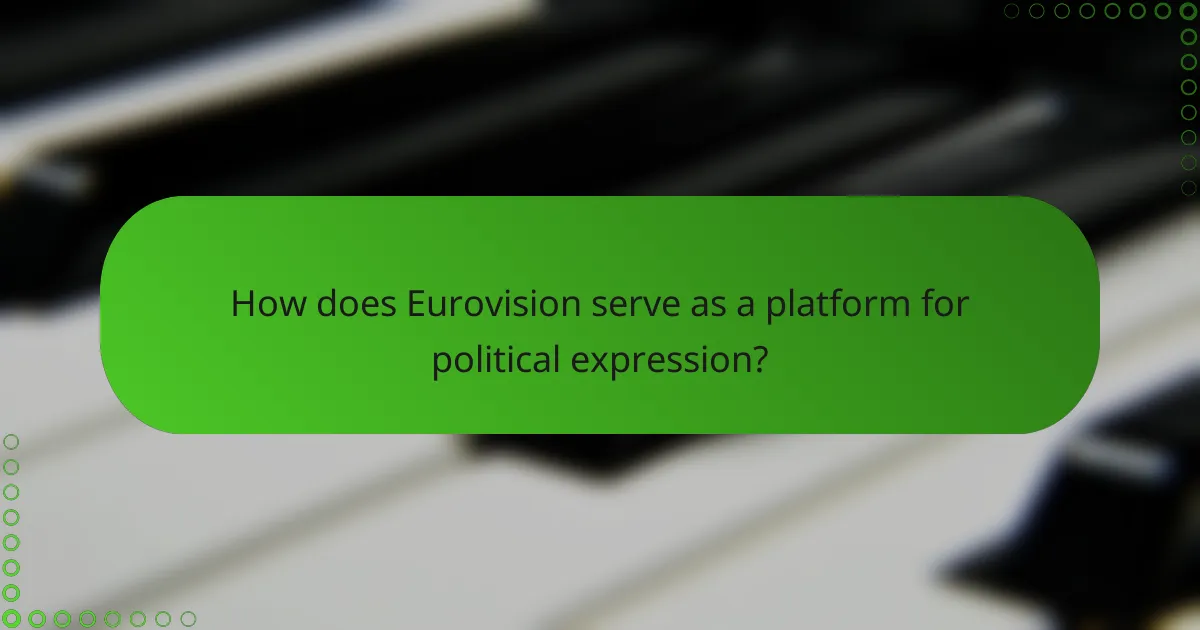
How does Eurovision serve as a platform for political expression?
Eurovision provides a unique stage for political expression, allowing artists to convey messages about social issues and national identities through their performances. The event often reflects current political climates, making it a focal point for both artists and audiences to engage with pressing global matters.
Artists addressing political issues
Many Eurovision participants use their performances to highlight political issues relevant to their countries or the broader international community. For instance, artists from nations facing conflict or oppression often incorporate themes of resistance and hope into their acts. This approach not only raises awareness but also fosters solidarity among viewers.
In recent years, some performers have openly criticized government policies or social injustices, using their platform to advocate for change. This trend encourages a dialogue about political matters, making Eurovision more than just a music competition.
Song lyrics with political messages
Song lyrics in Eurovision entries frequently contain political undertones, addressing topics such as human rights, equality, and national pride. For example, songs may reference historical struggles or current events, resonating with audiences on a deeper level. This lyrical content can provoke thought and inspire action among listeners.
Moreover, the use of metaphor and symbolism in lyrics allows artists to express complex ideas in a relatable manner. This creativity can amplify the impact of their messages, making them memorable and influential.
Public reactions to political performances
Public reactions to politically charged performances at Eurovision can vary widely, often sparking debates among viewers. Some audiences embrace these messages, celebrating the courage of artists who address challenging topics. Others may react negatively, feeling that political themes detract from the entertainment value of the event.
Social media plays a significant role in shaping these reactions, with viewers sharing their opinions and engaging in discussions. The immediate feedback can influence future performances, as artists gauge public sentiment and adjust their messages accordingly.
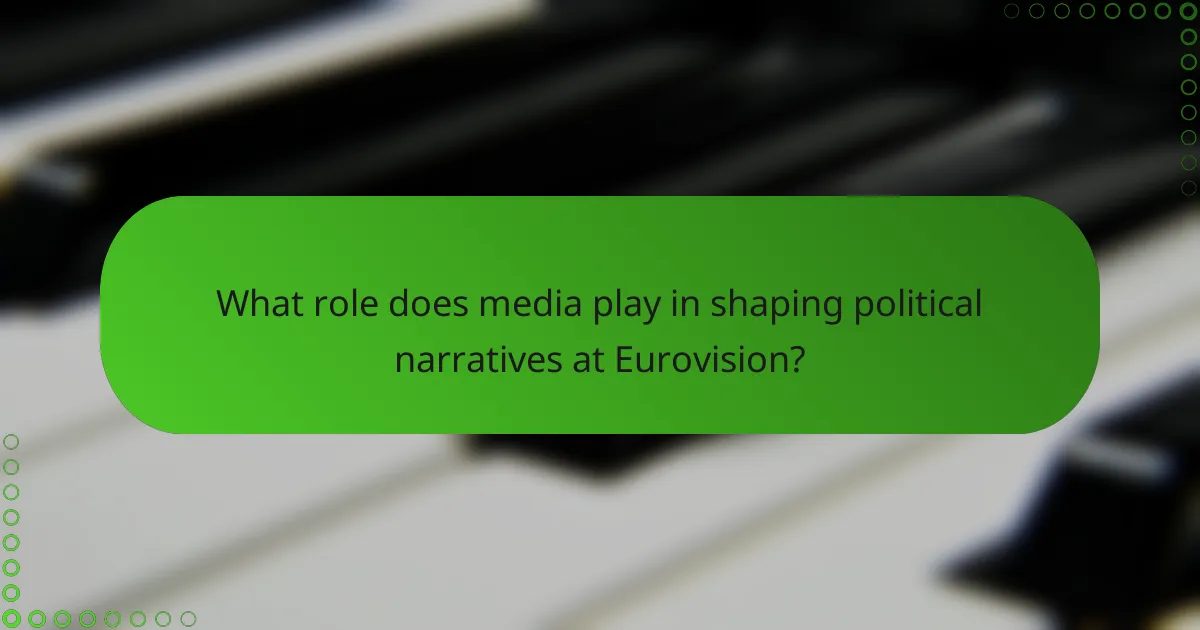
What role does media play in shaping political narratives at Eurovision?
Media plays a crucial role in shaping political narratives at Eurovision by influencing public perception and framing the context of performances. Through coverage and commentary, media outlets can highlight political tensions or cultural connections, affecting how audiences interpret the event.
Coverage by major news outlets
Major news outlets provide extensive coverage of Eurovision, often focusing on the political implications of the contest. They analyze voting patterns, national rivalries, and the impact of geopolitical issues on performances. This coverage can sway public opinion and create narratives that resonate beyond the event itself.
For example, when a country receives high points from a neighboring nation, media may interpret this as a sign of political solidarity, while low scores can be seen as a reflection of strained relations. Such interpretations can shape how audiences perceive both the contest and the countries involved.
Social media influence on public perception
Social media platforms amplify political narratives surrounding Eurovision by allowing users to share opinions and reactions in real time. Hashtags, memes, and viral posts can quickly shape the discourse, influencing how viewers interpret performances and voting outcomes.
For instance, a performance that is perceived as politically charged may spark widespread discussion on platforms like Twitter or Instagram, leading to a collective understanding of the event as a reflection of current political climates. This can enhance the emotional engagement of audiences and create a sense of community among viewers.
Documentaries highlighting political aspects
Documentaries focusing on Eurovision often delve into the political dimensions of the contest, exploring how it has been used as a platform for political expression. These films can provide historical context, revealing how past events have influenced contemporary performances and voting behavior.
For example, a documentary might examine how certain countries have used their entries to comment on social issues or political movements, thereby framing Eurovision as not just a music competition but also a stage for political discourse. Such insights can deepen viewers’ understanding and appreciation of the complexities involved in the event.
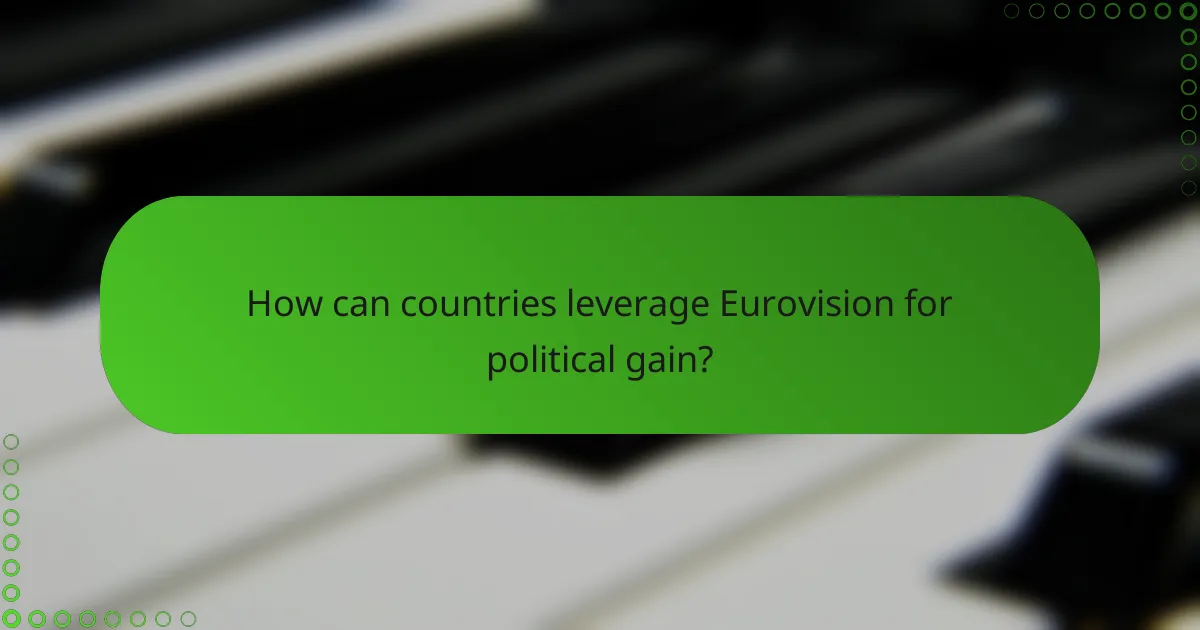
How can countries leverage Eurovision for political gain?
Countries can leverage Eurovision for political gain by using the event to enhance their international image, promote national culture, and engage in soft power diplomacy. By participating actively, nations can foster goodwill and strengthen their political relationships with other countries.
Promotion of national identity
Eurovision serves as a platform for countries to showcase their unique cultural heritage and national identity. Through music, costumes, and performances, nations can highlight their traditions and values, which can resonate with both domestic and international audiences.
For example, a country might choose to feature traditional instruments or folk dances in their performance, reinforcing their cultural narrative. This not only boosts national pride but also helps to create a distinct image on the global stage.
Use of Eurovision for soft power
Soft power refers to the ability to influence others through attraction rather than coercion. Countries can utilize Eurovision to enhance their soft power by promoting positive aspects of their culture and values. A well-received performance can lead to increased tourism and investment opportunities.
For instance, nations that consistently perform well may find that their cultural exports, such as music and film, gain more traction internationally. This can lead to stronger diplomatic ties and a more favorable global perception.
Strategic alliances through collaborations
Eurovision can be a catalyst for forming strategic alliances among participating countries. Collaborations in songwriting, staging, or even voting blocs can enhance mutual interests and foster closer relationships. Countries may choose to support each other during voting, which can be a strategic move to bolster their standings.
For example, neighboring countries or those with shared cultural ties often collaborate to create entries that appeal to a broader audience. This not only increases their chances of success but also solidifies political and cultural connections.
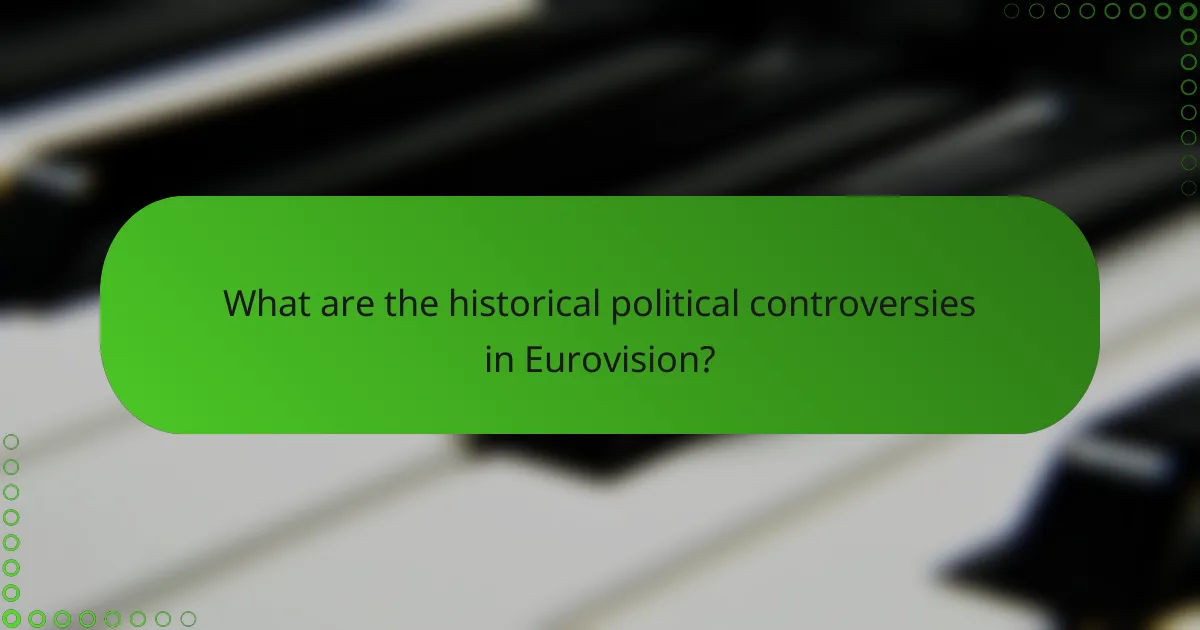
What are the historical political controversies in Eurovision?
Eurovision has a long history of political controversies that have shaped its reputation and impact. These controversies often arise from national tensions, geopolitical conflicts, and cultural disputes, influencing both the competition and its reception by audiences.
Notable disqualifications and scandals
Throughout its history, Eurovision has seen several notable disqualifications and scandals that have sparked debate. For instance, in 2000, the entry from Italy was disqualified due to a violation of the contest’s rules regarding song originality. Such incidents often lead to public outcry and discussions about fairness and transparency in the selection process.
Another significant scandal occurred in 2019 when the Israeli entry faced backlash due to the ongoing Israeli-Palestinian conflict. This situation highlighted how political sentiments can overshadow the artistic aspects of the competition, leading to calls for boycotts and heightened scrutiny of participating countries.
Boycotts and their implications
Boycotts in Eurovision often arise from political disagreements or social issues, impacting the event’s dynamics. Countries like Armenia and Azerbaijan have boycotted each other’s entries due to ongoing territorial disputes, which can diminish the spirit of unity that Eurovision aims to promote.
The implications of such boycotts can be significant, affecting not only the countries involved but also the overall audience engagement. When a country withdraws, it can lead to reduced viewership and a less diverse competition, ultimately altering the cultural exchange that Eurovision seeks to foster.
